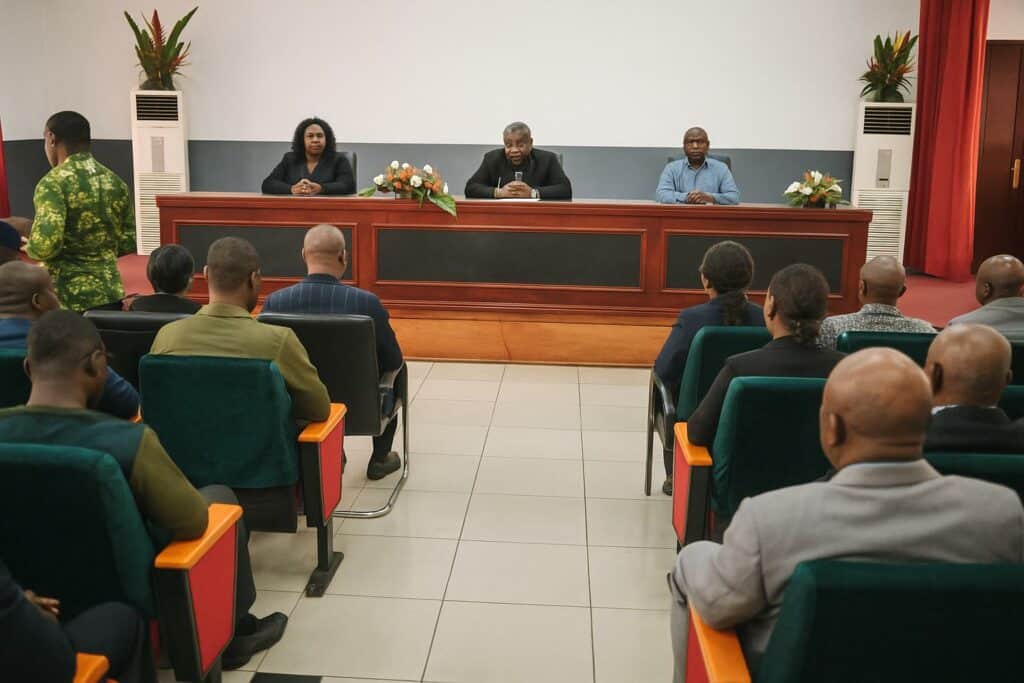Congo school reopening 2025: date firmly set
With a tone that mixed resolve and reassurance, Jean-Luc Mouthou, Minister of Pre-school, Primary, Secondary Education and Literacy, confirmed that classes will resume across Congo-Brazzaville on Wednesday 1 October 2025. Speaking on 29 September in Brazzaville during a meeting with the prefects of six départements, he dismissed suggestions of postponement. In his words, “The government is ready: Wednesday 1 October 2025, it is the reopening nationwide.” By stressing governmental preparedness while acknowledging lingering parental concerns, the minister sought to end speculation and give schools a clear operational horizon.
Rural textbook distribution strengthens equity
The same ceremony served as the launch pad for a strategic dispatch of French and mathematics textbooks to learners in the Plateaux, Pool, Cuvette, Cuvette-Ouest, Sangha and Likouala départements. These areas, largely rural or semi-urban, have historically suffered from an uneven supply of pedagogical resources. Augustin Nombo, Director-General of the National Institute for Research and Pedagogical Action (INRAP), underlined that the operation “targets rural and semi-rural zones that are often disadvantaged” and that allocations are calibrated to the country’s new administrative map.
Inside the numbers: production and allocation
The initiative builds on a first phase carried out last year in Brazzaville and Pointe-Noire. For the 2025-2026 academic cycle, INRAP has produced 252,250 mathematics textbooks and 198,050 French textbooks for the primary level, bringing the total dispatch to more than 450,000 copies. Nombo insisted on qualitative as well as quantitative gains, describing “updated content, simplified illustrations, an attractive layout and full alignment with the competency-based approach”. By focusing on the two foundational disciplines in early schooling, the ministry hopes to narrow learning gaps that tend to widen with each grade when resources are scarce.
Teacher training Congo: reinforcing the frontline
Distribution alone, officials concede, does not automatically translate into classroom impact. Accordingly, the ministry has scheduled dedicated training sessions so that teachers, including volunteer and community educators, can exploit the new material to its full potential. This pedagogical up-skilling forms part of a broader strategy to lift overall performance in literacy and numeracy while reducing disparities between urban and rural schools.
Monitoring school materials: an evaluation framework
A follow-up mechanism has been designed to track the trajectory of every book from warehouse to pupil’s desk. The aim is to ensure that the sizeable public investment results in measurable learning gains. By coupling distribution with monitoring, authorities hope to build an evidence base that will inform future textbook procurement and curricular revisions.
Key takeaways for stakeholders
The government’s reaffirmation of the 1 October reopening date, combined with a textbook injection exceeding 450,000 copies, signals robust institutional commitment to educational equity. By concentrating on under-resourced rural départements and coupling material support with teacher training, officials seek to create a virtuous cycle that enhances student performance, motivates educators and reassures parents.
Legal and economic considerations
From a legal standpoint, the textbook programme aligns with the constitutional mandate to guarantee equal access to education throughout the Republic of the Congo. Economically, bulk production and centralized logistics facilitate economies of scale, containing unit costs at a time of budgetary prudence. The emphasis on competency-based content also anticipates longer-term workforce needs, positioning future graduates to contribute more effectively to national development.
Managing labour tensions: a calibrated response
The minister also addressed potential labour unrest among volunteer and community teachers who have threatened strike action. He acknowledged that their demands are “legitimate” and assured the public that negotiations are under way. By portraying the agitation as a recurring indicator of an imminent school year rather than a crisis, he projected confidence that dialogue would prevail and that the 2025-2026 rentrée would unfold in a climate of constructive engagement.
Looking ahead
As the clock ticks toward 1 October 2025, the success of the textbook drive will be assessed not only by delivery metrics but by its capacity to bolster foundational competencies across all corners of the nation. Should the monitoring system validate the anticipated gains, the operation may well become a template for subsequent interventions in other subject areas, further consolidating Congo-Brazzaville’s incremental stride toward educational inclusion.

